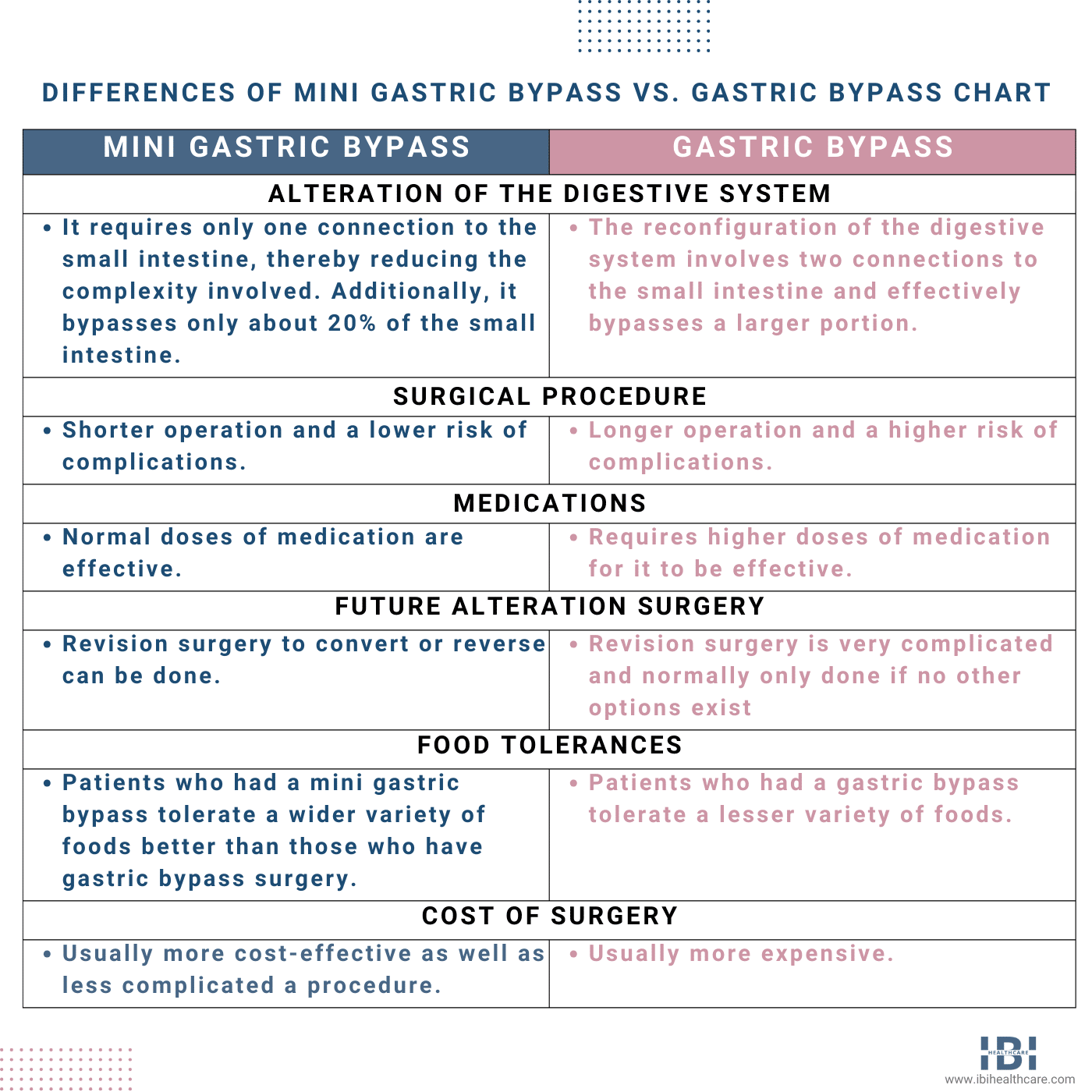Explore the potential long-term outcomes, including weight maintenance and health improvements, associated with mini gastric bypass surgery and traditional gastric bypass, aiding your decision-making process.
Looking into bariatric surgery options? Curious about the differences between mini gastric bypass vs. gastric bypass and which one is better? Discover the similarities, distinctions, and expected outcomes for each.
When considering whether Gastric Bypass Surgery (Roux-en-Y) or a Mini Gastric Bypass may be a good choice for you it is important to note that both techniques yield significant weight loss results in a short period. But the technique used is very different with gastric bypass surgery altering more of the digestive system which can result in a longer recovery time.
What Is Roux-en-Y Gastric Bypass Surgery?
During gastric bypass surgery, the surgeon makes the stomach much smaller and shapes it into a small pouch about the size of an egg that can hold about 2 ounces of food. Next, the surgeon splits the small intestine into two pieces, a procedure known as a double anastomosis, and attaches one piece to the bottom of the newly formed pouch while rerouting the other piece lower down on the small intestine. This bypasses the majority of the small intestine and the digestive system.
How Does Weight Loss Occur through Gastric Bypass?
Significant weight loss is obtained because the smaller stomach makes it impossible for very much food to be eaten in one sitting. Also, since the food ingested is bypassing most of the digestive system, very few calories can be absorbed and turned into fat.
What is a Mini Gastric Bypass Surgery?
During mini gastric bypass surgery, the stomach is made much smaller and shaped into a tube shape that can hold 4-6 Oz of food. The surgeon then reroutes one portion of the small intestine and connects it a bit lower down so that it bypasses about 20% of the digestive system, also called a single anastomosis.
How Weight Loss Occurs through a Mini Gastric Bypass?
Firstly, the smaller stomach size limits the amount of food that individuals can eat at meals, resulting in significant weight loss. Additionally, bypassing a portion of the digestive system prevents the absorption of many calories and nutrients.
How are Mini Gastric Bypass and Gastric Bypass Compared?
Key Elements of Each Surgery Chart
| Mini Bypass | Bypass |
|---|---|
| Surgery Length | |
| 1,5-2 hours | 2,5-3 hours |
| Hospital Stay | |
| 2-3 days | 2-3 days |
| Complication Risks | |
| 2,9% | 7% |
Similarities of Gastric Bypass vs. Mini Gastric Bypass
- Overall potential weight loss – both procedures offer up to 60% of excess body weight.
- Restrictive – both procedures limit the amount of food that can be eaten. Gastric bypass: stomach size is reduced to 2 oz size. Mini bypass: stomach size is reduced to 4-6 oz size.
- Malabsorptive – both procedures modify the digestive system causing less absorption of nutrients, calories, and vitamins so patients must take supplements & vitamins for the rest of their lives to ensure the body gets what it needs.
- Both procedures offer relief from weight-related health issues – many higher-weight patients suffer from health issues that are directly related to their weight. By eliminating the excess weight, many of these issues are also eliminated or relieved. Moreover, these issues may include type 2 diabetes, high blood pressure, and sleep apnea.

Who is a Candidate?
- Patients with a BMI of 40+.
- Patients with a BMI of 35+ and weight-related health issues.
- Patients who have tried other weight loss methods including diet and exercise failed.
Real-Life Results After Mini Gastric Bypass vs. Gastric Bypass
Firstly, gastric bypass and mini-gastric bypass results are remarkably similar. Moreover, the researchers published the results of a randomized controlled clinical trial in 2005 that compared patient results between traditional gastric bypass surgery and mini-gastric bypass surgery. Additionally, there were some interesting statistics:
- The trial involved 80 patients aged 18-59, and all of them participated for the full 2 years.
- Both groups were treated laparoscopically. The surgery for gastric bypass averaged 205 minutes while the mini-bypass surgery time averaged 148 minutes.
- The gastric bypass group stayed in the hospital longer and required larger doses of pain medication than the mini-bypass group.
- There was no mortality in either group.
- There was 1 conversion In the gastric bypass group meaning the surgery started laparoscopically but had to be performed as open surgery.
- 6 patients in the gastric bypass group developed minor complications including ileus, bleeding in the upper gastrointestinal tract, and leakage from a drainage tube but all recovered with treatment. There were no major complications in the mini-gastric bypass group only 3 minor ones.
- There were no major but 3 (7.5%) minor complications in the mini-gastric bypass group.
- Both groups equally reported significant increases in quality of life.
Excess Weight Loss Comparison Chart
| Mini Bypass | Bypass |
|---|---|
| Year 1 | |
| 64.9% | 58.7% |
| Year 2 | |
| 64.4% | 60.0% |
Furthermore, residual weight loss was accomplished in 75% of the gastric bypass patients and 95% in the mini-bypass patients. However, the study concluded with the statement that both procedures were effective against morbid obesity. Mini-gastric bypass surgery is less complicated and poses fewer risks than traditional gastric bypass surgery, however, delivers the same potential weight loss results.
Video: Mini Gastric Bypass Patient Recovered within 12 Hours
During your consultation, we will thoroughly discuss the different weight loss options in detail. Nonetheless, together, we can choose the one that best fits your specific needs and goals. So, make that call today – we eagerly await the opportunity to take the first of many steps with you on your weight loss journey.











